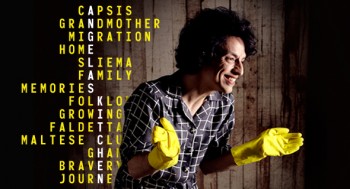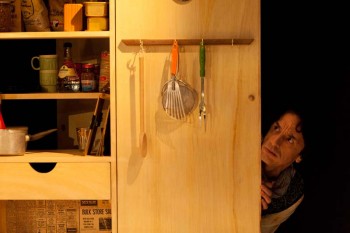Angela’s Kitchen – Sydney return season

Angela’s Kitchen is a one man show in what is becoming a growing trend in theatrical memoir. Perhaps a new phrase needs to be coined – like has happened lately in TV e.g. ‘docudrama’ ‘dramality’ or ‘creative non-fiction’. What about ‘dramoir’ or ‘theaography’? I’m feeling pretty clever until I see the back of the program and see the phrase ‘autobiographical theatre’, I think my ideas are more creative, but, whatever…
So this is not a new genre of theatre and almost seems to be a right of passage for Australian performers, particularly if they have a cultural discourse that is different from the mainstream. For Paul Capsis it is his Maltese heritage and his experience of being second generation Australian.
The story is told from both the perspective and reflective of his Grandmother, Angela. Paul Capsis, among other things, is a wonderful mimic and he flips effortlessly from one familial character to another and can make the kitchen seem full of people and life. It is very busy and occasionally I got lost but Capsis’ timing is impeccable enough to round each scene off with poignancy.

There is an interesting story here and the program provides the entire script and as I am watching and then later, reading, something is niggling at me. I think it is that, as a play, it may read better on the page. This is the beginning of the run of performances and the show will begin to tour and it won’t surprise me if this play ages beautifully, like fine wine, as it travels. The script is beautiful, the performance personable and professional and there is a lovely use of symbolism with the cupboard, table and fridge in a small space but it sometimes felt like a stage reading. As the family tree grows taller and taller, it begins to feel more like a speech, and while the facts are intriguing there is both not enough, and too much time given to detail when character is needed.
This is the difficulty of ‘theography’ (I’m hoping the term catches on), is it must be a piece of theatre first and a biography second. The challenge is to create distinct characters, build pace and tension rather than just tell a story. There is more than enough to keep an audience interested in this show, it is eminently watchable but if given some leeway, could continue to grow and build to something rich and full-bodied, layered and full of the tension and the joy that is family.
